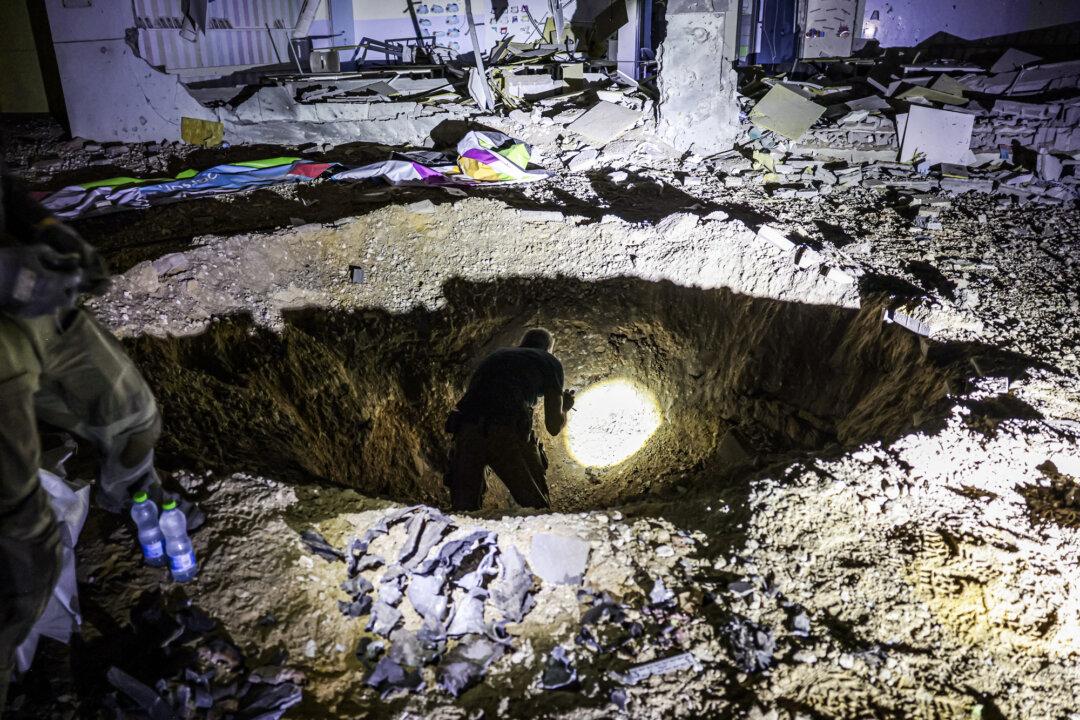Commentary
Iran attacked Israel with 181 ballistic missiles on Oct. 1. That’s 61 more than the 120 ballistic missiles that Iran fired in its last massive wave of attacks on Israel in April. Both times, they were almost all defeated by superior U.S. and Israeli anti-missile technologies. This is an incredible win for the United States and our allies. We should give our taxpayers—and the engineers and physicists who invented these missile defenses—a huge pat on the back. They may someday protect our cities from a nuclear attack.
But the defensive win does not change the fact that innocent Israelis again had to hide because of persistent Iranian anti-Semitism. Reportedly, almost all of Israel was ordered into bomb shelters. Tehran continues to fund its proxy terror organizations, including Hezbollah, Hamas, and the Houthis. The mullahs continue to order attacks on Israel, U.S. forces in the Middle East, and international shipping.
The win on Oct. 1 does not change the fact that Iran keeps sending exploding drones and drone technologies to Russia to attack Ukrainian civilians. Nor that Iran is trying to develop nuclear weapons that would multiply its conventional terrorism into the threat of nuclear terrorism, nuclear war in the Middle East, and nuclear proliferation to that region’s other dictators.
Secretary of Defense Lloyd Austin warned Iran before the attack of “serious consequences” if it proceeded. So we cannot now ask Israel, as we did last time, to “take the win” and turn the other cheek. Both cheeks are now slapped and burning red.
Senate Minority Leader Mitch McConnell (R-Ky.) responded after the attack by calling for severe consequences: “It is not enough to intercept missiles and drones moments before they reach civilians in Israel or U.S. personnel in the Red Sea. It is time for America to act like the friend of Israel we claim to be.”
The United States happens to be in a position to help a great deal given our two aircraft carriers and multiple military bases in the region. A standard military strategy is to attack an adversary at its “center of gravity” or COG. The Iranian COG is arguably its nuclear weapons and uranium facilities, ballistic missile production lines, rocket factories, and drone assembly plants. This would decrease the supply of all these weapons systems to not only terrorist groups regionally—and the mullahs who supply them to all three “H” groups—but to the Russian military as well. Iran is a major supplier of oil to China. Taking out its oil and military export hubs that supply the new “axis of evil” could stall attacks by the others as well.
Iran wants to use its oil and military exports—and terrorist proxy groups—to expand into the status of a regional “hegemon” at the expense of not only Israel but also U.S. allies such as Saudi Arabia. If Iran goes nuclear, the Saudis will want to do so as well and will likely get assistance from Pakistan, which already has nuclear weapons and has just as much interest in containing Iran as does the rest of the region. According to a senior NATO official in 2013, Pakistan has already manufactured nuclear weapons for Saudi Arabia. They are on order ready for shipment as soon as Riyadh makes the request.
In a world populated by regimes like Iran, China, Russia, and North Korea, which far too frequently attempt to threaten and exploit any democracy that lets down its guard even a little, a robust deterrence is required to keep the peace. This means exactly what Israeli Prime Minister Benjamin Netanyahu said on Sept. 27 to Iran: “If you strike us, we will strike you.”
As sad and crude as that tit-for-tat strategy is, it is typically successful at deterring military attacks and keeping the peace.
To be effective, the strategy must also be credible, meaning that the adversary needs to believe the threat. This requires us to be both powerful—peace through strength—and committed enough to follow through. When the United States and its allies do not hit back hard when attacked, for example in Ukraine, the South China Sea, or the last major Iranian attack in April, then the adversary will wrongly conclude that we are weak and attack again. Other adversaries will watch and want to join in. If deterrence crumbles enough, as it did before World War II, we will find ourselves in another global war.
This is exactly what happened in April. Israel tried to deescalate with symbolic retaliation, and Iran kept attacking, through Hezbollah and directly with even more ballistic missiles. China and Russia redoubled their efforts to take neighbors by force.
So, to reestablish credibility, Israel should hit back far harder this time. The United States should help. That does not mean targeting civilians—that would be illegal according to international law and invite the condemnation of global public opinion.
There is a far better option: to hit Iranian military-industrial targets, including the Iranian factories that produce the missiles, rockets, drones, and ultimately nuclear warheads that make Iran such a threat, as well as the oil transport hubs that facilitate sales to China. This is what we call a “logical consequence.” If dictatorships, as in Iran, misuse their weapons, they lose them. Israel, the United States, and our allies, in a coalition of the willing, can make sure of that to ensure the peace far beyond the Middle East.





